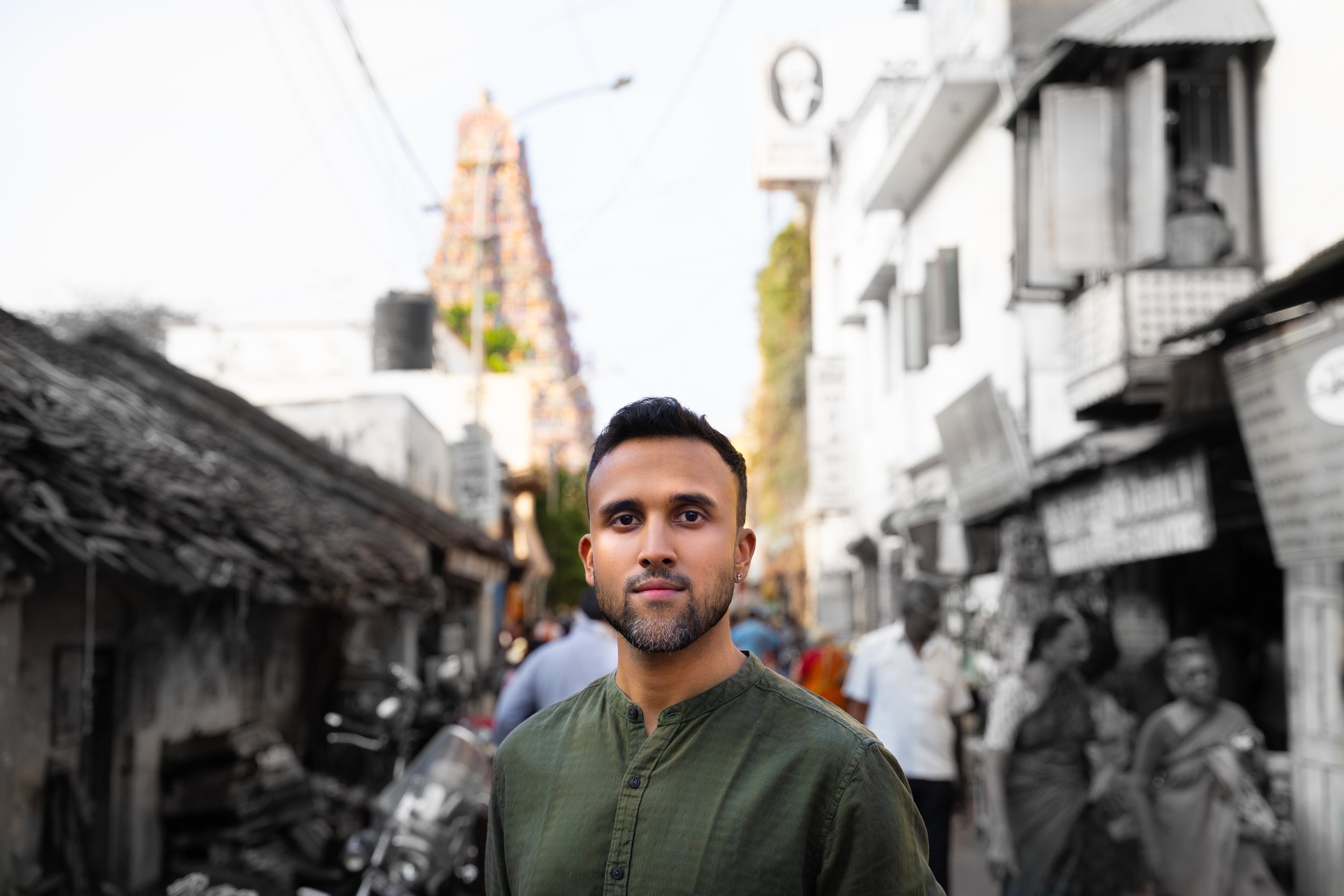Aditya Prakash - ISOLASHUN
Aditya Prakash
ISOLASHUN
On Friday, October 13, 2023, the virtuosic Karnatik vocalist, Aditya Prakash, will release his debut solo album, ISOLASHUN, via New Amsterdam Records. Prakash has collaborated with a diverse range of innovative artists, who have praised him as a “visionary artist that has found a way to speak to everyone while speaking in his own language” (Tigran Hamasyan) who “makes art that truly reflects the mixes and contradictions, the conflicts and confluences of our lives” (Anoushka Shankar) and is known for his “strong, [and] powerful voice” (Ravi Shankar). On ISOLASHUN, Prakash explores the weight of privilege and the boundaries of Karnatik tradition by challenging its customary themes of beauty, devotion, and celebration with those of turmoil, angst, pain, anger, and protest.
ISOLASHUN was created in Prakash’s garage studio during the lockdown and is a reflection of his inward journey during the pandemic, marked by the solitude and introspection shared by millions of people around the world, as well as a growing awareness of the social disparities that starkly revealed themselves in that period.
Throughout ISOLASHUN, Prakash’s powerful vocal performance, intricately-textured compositions, and experiential approach to Karnatik music fuse to create a deeply personal statement that explores how “the political happenings in my two homes —India and the USA — made me painfully aware of the one-sidedness of history that I was taught since childhood: how Indian “classical” art forms are glorified as infallible and divine but [are] built on discrimination and oppression. It made me aware of my apathy, made possible by my privilege, that until now had allowed me to look away from my own complicity in these systems.”
-
ISOLASHUN, by Aditya Prakash, is an album grounded in self-critique that questions notions of beauty tied to the “classical” aesthetic and explores the tension in Prakash's own dual identity.
“The starting point was the pandemic, due to the solitude that it brought me as an artist: with my engagements canceled, forced to stay in one place, unmotivated, uninspired, fed constantly by the news, and forced to see the realities that I had conveniently ignored, within me and in the world around me.
Something that seemingly united us all, brought forth even more pronouncedly the social inequities and division the world over. The political happenings in my two homes — India and the USA — made me painfully aware of the one-sidedness of history that I was taught since childhood: how Indian “classical” art forms are glorified as infallible and divine but [are] built on discrimination and oppression. It made me aware of my apathy, made possible by my privilege, that until now had allowed me to look away from my own complicity in these systems.
The research and work of my mentor TM Krishna, coupled with the investigation of my own personal and artistic choices, made me aware of the tension in my identity. On one hand, I am a brown artist trying to find accessibility and assimilation in a white world. On the other hand, I am an upper-caste practitioner, claiming ownership of the Karnatik form which is steeped in social hierarchy and caste-discrimination.
Were my choices in the aesthetics of sound a product of my identity? Did I need to fuse Karnatik music with Western musical styles to make it appealing, accessible, and worthy of acceptance? Could I trust the power, depth, and layers of my Indian musical training without presenting it through a Western lens?
That compelled me to dig deeper into my Indian Music: Was music only about upliftment? Were the aesthetic sound constructs of beauty and refinement able to also reflect the tension, violence, and messiness of my reality? Was it going against the form to open up a space for the abrasive and jarring to coexist with the melodious?
In asking these questions through my musical explorations, I began to see the complexity, nuance, and multiplicity in my histories, my identities, my notions of beauty, and my emotional response to the world around me.”
ISOLASHUN is not only a music album, but also includes a podcast series, a short film for the track INSIRGENTS directed and choreographed by Akram Khan and co-directed by Maxime Dos (currently under consideration at film festivals with an anticipated online release in 2025), and a live one-person performance by Aditya Prakash, directed by Mythili Prakash, set to premiere at UCLA Center for Art of Performance in 2024.
-
Tracklist
isolation
ISOLASHUN
INSIRGENTS
MAYA
3AM
XenoF.O.B.
End
AMYZON (vinyl exclusive track)
Credits
Composers/Arrangement:
Aditya Prakash [track 1-7]
Sushma Soma [track 7]
Kumar Gandharva (original rendition of “MAYA” track 4)
Lyricists:
Aditya Prakash [track 3]
Bhagavad Gita [track 3]
Kabir [track 4]
Nawab Wajid Ali Shah [track 6]
Sushma Soma [track 7]
Sound Design and Concept:
Aditya Prakash
Producer:
Aditya Prakash
Performers:
Aditya Prakash – Vocals, Mridangam [track 3], Tambura [track 4,7]
Arun Ramamurthi – Violin [track 2]
Guhan Venkataraman – Vina [track 2]
Owen Clapp – Electric Bass [track 2]
Praveen Sparsh – Mridangam [track 5]
Megan Shung – Violin, Viola [track 6]
Engineers:
Aditya Prakash – Recording Engineer, Pre-mix Engineer
MT Aditya Srinivasan – Mixing Engineer
Gethin John (Hafod Mastering) – Mastering Engineer
Artwork:
Design – Brock Lefferts
Photography – Maxime Dos
Image Choreography – Akram Khan




